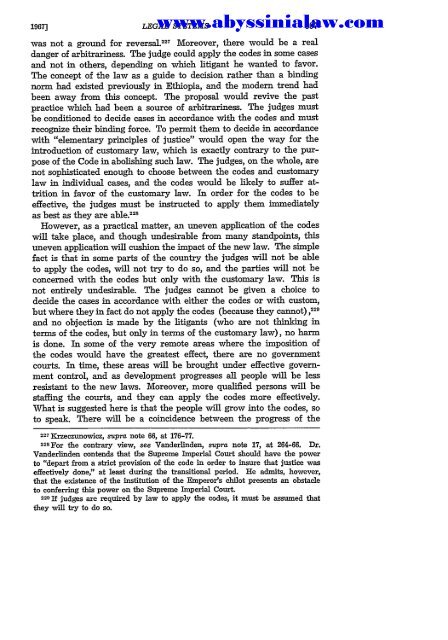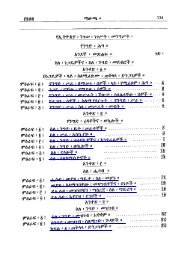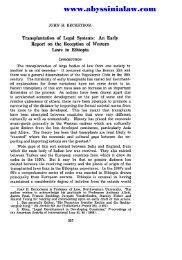You also want an ePaper? Increase the reach of your titles
YUMPU automatically turns print PDFs into web optimized ePapers that Google loves.
19671 LEGAL www.abyssinialaw.com<br />
SYSTEMS<br />
was not a ground for reversal.227 Moreover, there would be a real<br />
danger of arbitrariness. The judge could apply the codes in some cases<br />
and not in others, depending on which litigant he wanted to favor.<br />
The concept of the law as a guide to decision rather than a binding<br />
norm had existed previously in Ethiopia, and the modern trend had<br />
been away from this concept. The proposal would revive the past<br />
practice which had been a source of arbitrariness. The judges must<br />
be conditioned to decide cases in accordance with the codes and must<br />
recognize their binding force. To permit them to decide in accordance<br />
with "elementary principles of justice" would open the way for the<br />
introduction of customary law, which is exactly contrary to the purpose<br />
of the Code in abolishing such law. The judges, on the whole, are<br />
not sophisticated enough to choose between the codes and customary<br />
law in individual cases, and the codes would be likely to suffer attrition<br />
in favor of the customary law. In order for the codes to be<br />
effective, the judges must be instructed to apply them immediately<br />
as best as they are able. 228<br />
However, as a practical matter, an uneven application of the codes<br />
will take place, and though undesirable from many standpoints, this<br />
uneven application will cushion the impact of the new law. The simple<br />
fact is that in some parts of the country the judges will not be able<br />
to apply the codes, will not try to do so, and the parties will not be<br />
concerned with the codes but only with the customary law. This is<br />
not entirely undesirable. The judges cannot be given a choice to<br />
decide the cases in accordance with either the codes or with custom,<br />
but where they in fact do not apply the codes (because they cannot) 229<br />
and no objection is made by the litigants (who are not thinking in<br />
terms of the codes, but only in terms of the customary law), no harm<br />
is done. In some of the very remote areas where the imposition of<br />
the codes would have the greatest effect, there are no government<br />
courts. In time, these areas will be brought under effective government<br />
control, and as development progresses all people will be less<br />
resistant to the new laws. Moreover, more qualified persons will be<br />
staffing the courts, and they can apply the codes more effectively.<br />
What is suggested here is that the people will grow into the codes, so<br />
to speak. There will be a coincidence between the progress of the<br />
2 2 7 rzeczunowicz, supra note 66, at 176-77.<br />
225 For the contrary view, see Vanderlinden, supra note 17, at 264-66. Dr.<br />
Vanderlinden contends that the Supreme Imperial Court should have the power<br />
to "depart from a strict provision of the code in order to insure that justice was<br />
effectively done," at least during the transitional period. He admits, however,<br />
that the existence of the institution of the Emperor's chilot presents an obstacle<br />
to conferring this power on the Supreme Imperial Court.<br />
229 If judges are required by law to apply the codes, it must be assumed that<br />
they will try to do so.





